Related Research Articles

Saskatchewan is a prairie and boreal province in Western Canada, the middle of the three prairie provinces. It is bordered on the west by Alberta, on the north by the Northwest Territories, on the east by Manitoba, to the northeast by Nunavut, and on the south by the U.S. states of Montana and North Dakota. Saskatchewan and Alberta are the only landlocked provinces of Canada. As of Q2 2022, Saskatchewan's population was estimated at 1,186,308. Nearly 10% of Saskatchewan’s total area of 651,900 square kilometres (251,700 sq mi) is fresh water, which is composed mostly of rivers, reservoirs, and the province's 100,000 lakes. The absence of nearby moderating bodies of water results in severe winters throughout the province, on account of Saskatchewan's continental climate. Southern areas have very warm or hot summers. In winter, temperatures below −45 °C (−49 °F) are possible even in the south during extreme cold snaps.
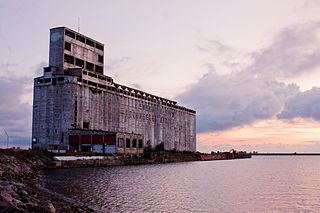
A grain elevator is a facility designed to stockpile or store grain. In the grain trade, the term "grain elevator" also describes a tower containing a bucket elevator or a pneumatic conveyor, which scoops up grain from a lower level and deposits it in a silo or other storage facility.

Percy Schmeiser was a Canadian businessman, farmer, and politician. In 1954, he took over the operations of the family owned farm, gas station, and farm equipment dealership. He renamed the farm equipment dealership Schmeiser's Garage and added a second farm equipment dealership in Humboldt, Saskatchewan in 1986 and oversaw their operations until their sale in 2003.

Lafleche is a small town in southwest Saskatchewan, Canada in the rural municipality of Wood River.

A market garden is the relatively small-scale production of fruits, vegetables and flowers as cash crops, frequently sold directly to consumers and restaurants. The diversity of crops grown on a small area of land, typically from under 0.40 hectares to some hectares, or sometimes in greenhouses, distinguishes it from other types of farming. A market garden is sometimes called a truck farm.
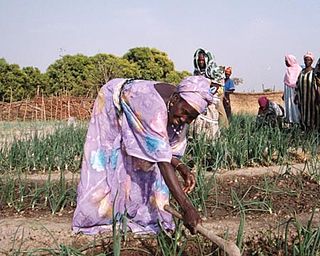
An agricultural cooperative, also known as a farmers' co-op, is a cooperative in which farmers pool their resources in certain areas of activity.
Rockglen is a community in the Burning Hills of the Wood Mountain Uplands, in Saskatchewan, Canada, providing a school, community hall, public library and five parks, as well a local service industry. The municipal office of Rural Municipality #12 Poplar Valley lies within the boundaries of Rockglen, and Rockglen businesses are supported primarily by agriculture. In the Burning Hills agriculture consists of dry land farming and cattle. Rockglen is located along Highway 2 south of Assiniboia, Highway 18 west of Coronach, and Highways 2 and 18 north of Port Poplar River. In addition Rockglen Airport (CKC7) lies 2.2 km east of town.

Kyle is a town in Lacadena Rural Municipality No. 228, in the province of Saskatchewan, Canada. The town had a population of 423 in the 2006 Census. The village was named for its original settler, Jeremiah Kyle, in 1923. Kyle is 72 kilometres (45 mi) north of Swift Current, and is situated along the remains of the historic Swift Current-Battleford Trail, 201 kilometres (125 mi) south-west of Saskatoon, 320 kilometres (200 mi) west of Regina and 32 kilometres (20 mi) north of Saskatchewan Landing Provincial Park on Highway 4. The Canada Post postal code for Kyle is S0L 1T0.

Farmland Industries was the largest agricultural cooperative in North America when it eventually sold all of its assets in 2002–04. During its 74-year history, Farmland served its farmer membership as a diversified, integrated organization, playing a significant role in agricultural markets both domestically and worldwide.

The Co-operators Group Limited is a Canadian insurance co-operative, founded in 1945, owned by 44 members including co-ops, credit union centrals and representative farm organizations. It is one of the leading Canadian-owned multi-line insurers, offering auto, home, life, farm, travel and business insurance as well as investments. The company was started by farmers in Saskatchewan, in 1945.
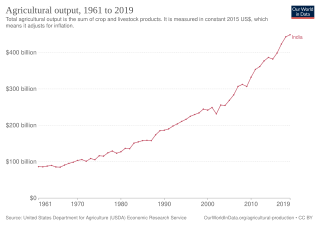
The history of agriculture in India dates back to the neolothic. India ranks second worldwide in farm outputs. As per 2018, agriculture employed more than 50% of the Indian work force and contributed 17–18% to country's GDP.
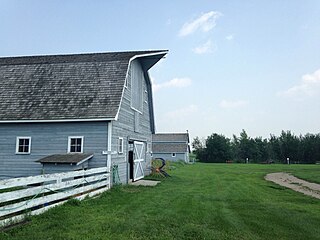
Seager Wheeler's Maple Grove Farm is a National Historic Site of Canada. Seager Wheeler's Maple Grove Farm was a farm owned and operated by agronomist Seager Wheeler (1868–1961) "Wheat King of the Prairies" or "The Wheat Wizard of Rosthern" who developed dry land farming techniques as well as fruit and wheat strains which could grow in a short prairie growing season followed by harsh winters. Seager came to Canada in 1885 and applied for his own homestead in 1890. His original homestead was located at NE Section 16 Township 38 Range 4 West of the 3rd Meridian, and he was aided by a loan from the Temperance Colonization Society Limited - Toronto Whereas the nearest present day town of Rosthern, Saskatchewan is located at Sec.35, Twp.42, R.3, W3. To get to the restored Seager Wheeler Maple Grove 185-acre (0.75 km2) Farm travel 7 km east of Rosthern. Five separate entries of wheat which were grown at this farm location during 1911 to 1918 won World Wheat Championships. Morris Bodnar, Member of Parliament for Saskatoon—Dundurn, commemorated Seager Wheeler's Maple Grove Farm as a National Historic Site of Canada on August 3, 1996 The site is honoured as the location where hardy wheat and fruit strains were developed which were well suited to the prairie climate and growing season.
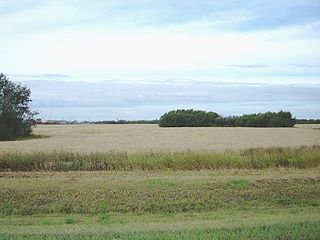
Agriculture in Saskatchewan is the production of various food, feed, or fiber commodities to fulfill domestic and international human and animal sustenance needs. The newest agricultural economy to be developed in renewable biofuel production or agricultural biomass which is marketed as ethanol or biodiesel. Plant cultivation and livestock production have abandoned subsistence agricultural practices in favor of intensive technological farming resulting in cash crops which contribute to the economy of Saskatchewan. The particular commodity produced is dependent upon its particular biogeography or ecozone of Geography of Saskatchewan. Agricultural techniques and activities have evolved over the years. The first nation nomadic hunter-gatherer lifestyle and the early immigrant ox and plow farmer proving up on his quarter section of land in no way resemble the present farmer operating huge amounts of land or livestock with their attendant technological mechanization. Challenges to the future of Saskatchewan agriculture include developing sustainable water management strategies for a cyclical drought prone climate in south western Saskatchewan, updating dryland farming techniques, stabilizing organic definitions or protocols and the decision to grow, or not to grow genetically modified foods. Domestically and internationally, some commodities have faced increased scrutiny from disease and the ensuing marketing issues.

Viterra began as a Canadian grain handling business, the nation's largest grain handler, with its historic formative roots in prairie grain-handling cooperatives, among them the iconic Saskatchewan Wheat Pool. Viterra Inc grew into a global agri-business with operations in Canada, the United States, Australia, New Zealand and China. Viterra operated three distinct, inter-related businesses: Grain Handling & Marketing, Agri-Products and Processing, enabling it to generate earnings at various points on the food production chain from field to the table. Following its $6.1-billion acquisition by Glencore International, on 1 January 2013 Viterra was merged with Glencore purchaser, 8115222 Canada Inc., headquartered in Rotterdam, the Netherlands.

Montmartre is a village in the Canadian province of Saskatchewan within the Rural Municipality of Montmartre No. 126 and Census Division No. 6. It is 91 km east of the City of Regina on Highway 48.
The economy of Saskatchewan has been associated with agriculture resulting in the moniker "Bread Basket of Canada" and Bread Basket of the World. According to the Government of Saskatchewan, approximately 95% of all items produced in Saskatchewan, depend on the basic resources available within the province. Various grains, livestock, oil and gas, potash, uranium, wood and their spin off industries fuel the economy.
The problem of land reform in Ethiopia has hampered that country's economic development throughout the late 19th and 20th centuries. Attempts to modernize land ownership by giving title either to the peasants who till the soil, or to large-scale farming programs, have been tried under imperial rulers like Emperor Haile Selassie, and under Marxist regimes like the Derg, with mixed results. The present Constitution of Ethiopia, which was put into force January 1995, vests land ownership exclusively "in the State and in the peoples of Ethiopia." The relevant section continues, "Land is a common property of the Nations, Nationalities and Peoples of Ethiopia and shall not be subject to sale or to other means of exchange." Despite these different approaches to land reform, Ethiopia still faces issues of sustainable food self-sufficiency.
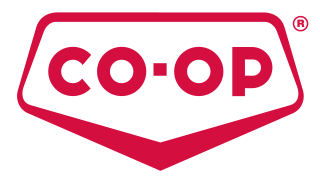
Federated Co-operatives Limited (FCL), operating as Co-op, is a co-operative federation providing procurement and distribution to member co-operatives in Western Canada. It was established in 1944 after a series of amalgamations of smaller cooperatives, starting in Saskatchewan, including the Saskatchewan Co-operative Wholesale Society and a fuel production and distribution co-op, the Consumers’ Co-operative Refinery Limited. Federated had expanded to Manitoba, Alberta, and British Columbia by 1970. Federated Co-operatives is owned by about 160 member co-operatives across the region. Some are large co-operatives, such as Saskatoon Co-op and Calgary Co-op, while others are small co-ops based in small towns, such as Abernethy Co-op.
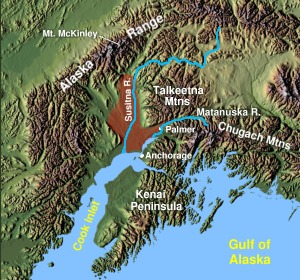
In 1935, the Federal Emergency Relief Administration created an experimental farming community known as the Matanuska Valley Colony as part of the New Deal resettlement plan. Situated in the Matanuska Valley, about 45 miles northeast of Anchorage, Alaska, the colony was settled by 203 families from Minnesota, Wisconsin and Michigan. The colony project cost about $5,000,000 and, after five years, over half of the original colonists had left the valley. By 1965, only 20 of the first families were still farming the valley.
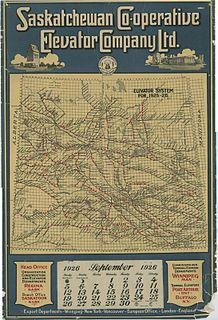
The Saskatchewan Co-operative Elevator Company (SCEC) was a farmer-owned enterprise that provided grain storage and handling services to farmers in Saskatchewan, Canada between 1911 and 1926, when its assets were purchased by the Saskatchewan Wheat Pool.
References
- ↑ "Matador Farming Pool and the Co-operative Farm Movement". Encyclopedia of Saskatchewan. Retrieved August 6, 2012.
- ↑ "Explore Kyle". Town of Kyle. Archived from the original on August 18, 2010. Retrieved August 6, 2012.
- ↑ "Matador Ranch's Last Season". Prairies North. Retrieved August 6, 2012.